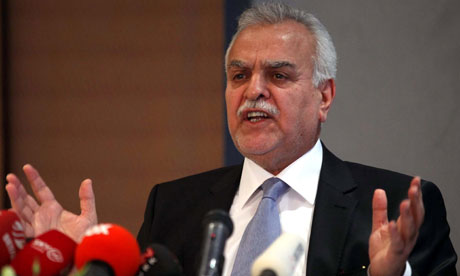By Ali Al-Bassam
Impunity Watch Reporter, Middle East
BAGHDAD, Iraq — Iraqi Vice President Tariq al-Hashemi and his Chief Officer Ahmad al-Qahtan were sentenced in absentia by the Criminal Court of Iraq last Sunday to death by hanging for the murders of Suhad al-Khafaji, a lawyer, and the National Security Officer, Talib Balasim. Speaking at a press conference in Turkey on Monday, Hashemi insisted his innocence and denounced the verdict, calling it “politically motivated.”

“While reconfirming my complete innocence and my guards, I totally reject and will never recognize the unfair, unjust and politically motivated verdict, which was expected at the beginning of this ridiculous lawsuit,” he said. Hashemi fled Iraq in December after the government announced the charges against him. The court has given him 30 days to return to Iraq to appeal the charges, but Hashemi has said that he will not return.
Since his escape, Hashemi, a Sunni, continues to criticize Shiite Prime Minister Nouri al-Maliki, his longtime rival, accusing him of manipulating the Iraqi judiciary. In a statement regarding Maliki, Hashemi’s political party, the secular Iraqiya political bloc, said that “[t]he conduct of court hearings only reinforces the feeling that the sentence by the court is politicized and predictable.”
Hashemi’s case has created an issue for the Iraqi government, as it has fueled resentment from Sunnis and Kurds against Maliki, who critics say is monopolizing power.
“The verdict is unjust, politicized, illegitimate and I will not recognize it,” Hashemi said. “But I put it as a medal of honor on my chest because it was Maliki, not anyone else, behind it. I’m proud that it is Maliki, and not anyone else, to target me.” He also said that “[t]he death sentence is a price I have to pay due to my love for my country and my loyalty to my people. I reiterate that I’m innocent, and am ready to stand before a fair judicial system and not a corrupt one under Maliki’s influence.”
Hashemi’s defense team also accused the court of losing its objectivity and siding with the Shia-led government. In his closing argument, attorney Muayad Obeid al-Ezzi, head of the defense team, said that “[f]rom the beginning and through all procedures, it has become obvious that the Iraqi judicial system has been under political pressure.” In an interview with Al Jazeera, Ezzi said “This ruling has no legal value or effect. In-absentia rulings cannot be considered final or enforced. It should remain with the court until the person sentenced is handed over to authorities or arrested.”
The Iraqi government has also accused Hashemi of playing a role in 150 bombings, assassinations, and other attacks from 2005 t0 2011 – most of which were carried out by his bodyguards and other employees.
The verdict against Hashemi is also expected to spark tension with neighboring Turkey.
“Political tensions are likely to escalate in Iraq and relations between Ankara and Baghdad could also worsen in the coming months,” said John Drake, a security specialist. Drake added that Hashemi’s death sentence “will certainly exacerbate divisions between Maliki and Iraqiya. This could hinder the work of Parliament.”
For further information, please see:
Al Bawaba — Iraqi VP Rejects Death Sentence — 10 September 2012
Al Jazeera — Iraq Vice-President Rejects Death Sentence — 10 September 2012
BBC News — Iraq VP Tariq al-Hashemi Rejects Guilty Verdict — 10 September 2012
Guardian — Iraqi Vice-President Tariq al-Hashemi Attacks ‘Unjust’ Verdict in Terror Trial — 10 September 2012
National Iraqi News Agency — Death Sentence to al-Hashemi and his Chief Office — 9 September 2012



